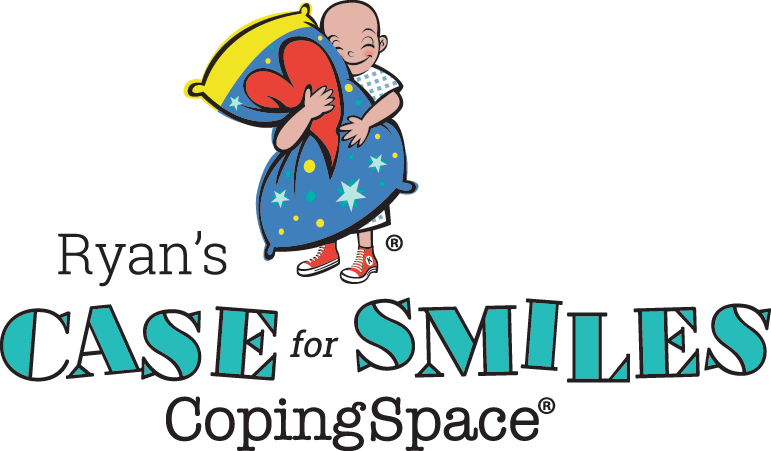BLOG
Helping Kids Manage Fear and Anxiety When They Have a Serious Illness
When a child has a serious or chronic illness, it’s normal for them to be afraid and feel anxious. After all, you surely worry too! Your child may think a lot about what happened, develop new fears, or worry something else might occur. It is also normal for them to regress, act out or become clingy. Fortunately, there are ways you can help kids manage fear and anxiety, and with caring and support, typically they return to normal.
How to Help a Child Cope with Worry and Fear
 Developing healthy coping skills is critical for kids with chronic and severe illnesses and injuries. It will allow them to manage their emotions during and after treatment, and face a variety of challenges in their life to come.
Developing healthy coping skills is critical for kids with chronic and severe illnesses and injuries. It will allow them to manage their emotions during and after treatment, and face a variety of challenges in their life to come.
Below are ways to help kids manage fear and anxiety. These tips are also great for siblings, who often struggle too.
Talk About Your Child’s Feelings and Answer Questions Honestly
While your first instinct may be to avoid talking about your child’s illness and focus on lighter topics, it’s important to create space for them to share their worries and concerns. You can start by simply asking what’s on their mind. Then listen patiently, and without any distractions.
Don’t be too quick to give advice or dismiss their worries. This can make them think they shouldn’t feel the way they do. Instead, simply let them share, allow room for silence, and validate how they feel. (For more tips on having difficult conversations, read How to Share Bad News with Your Child.)
At times, your child may have little to say or not be open to talking. In this case, simply let them know it’s fine and you are always there to listen. We all need time to process our feelings, but it can help just knowing they have a place to turn.
It’s also important to answer your child’s questions openly and honestly. Without guidance from you, kids make assumptions or worse, turn to the internet for help. Use simple words they can understand and call their illness or injury by its name. If you don’t know an answer, simply say that but assure your child you’ll find out. You can also ask your medical provider, child life specialist or other healthcare staff for help explaining their specific illness/injury and other medical questions. Or check out the appropriate Children page on CopingSpace for more tips and useful phrases.
Help Your Child Name Their Feelings
 Children (and often adults) can have trouble recognizing and identifying their feelings. This could make it even more difficult to deal with them and cope. Help your child name their emotions (scared, worried, upset) and express themselves in different ways. Younger children may enjoy using play, art or storytelling, while older kids and teens might prefer to journal or write about their experiences and feelings. They could also get creative and express themselves through poetry, songwriting, and art.
Children (and often adults) can have trouble recognizing and identifying their feelings. This could make it even more difficult to deal with them and cope. Help your child name their emotions (scared, worried, upset) and express themselves in different ways. Younger children may enjoy using play, art or storytelling, while older kids and teens might prefer to journal or write about their experiences and feelings. They could also get creative and express themselves through poetry, songwriting, and art.
It can be helpful to model healthy behaviors by talking about your own emotions and ways you cope. Sharing your feelings throughout the day shows kids they’re totally normal, and that even when emotions are difficult or overwhelming, there are ways to feel better or manage until they pass. For example, you might say, “I’m feeling worried about my meeting tomorrow. I think I’ll write in my journal tonight.” Or, “I’m really anxious right now and it’s making me cranky. I think I’ll go for a walk. Moving my body always makes me feel better.” Then you could invite them to join you or try the same.
Identify Your Child’s Triggers for Fear and Anxiety
It can be hard for children to be aware of the root cause of their feelings. Just like a toddler tantrums over the wrong color spoon, your child may seem to be set off by the strangest things. These are often triggers for their fear or anxiety. Try to notice when your child is feeling upset, “jumpy” or cautious. Are there patterns or certain situations that seem to make them anxious or angry? Are there reminders of their illness that really bother them?
Once you think you’ve identified some triggers, talk to your child about them. Explain that these feelings are a reaction to going through something scary, and that they will pass with time. Then help them come up with other things that make them worried or scared. Once they better understand why they react a certain way, they may feel a bit more in control.
Create a Plan to Manage Your Child’s Worries and Fears
 Kids do best when they are prepared to face challenges. Just like you might run through what to expect the first day of school or on a trip, it can be helpful to work together to create a coping plan for when their fears and worries feel like too much. It’s important you don’t dive in to solve their problems right away. Instead, let them take the lead and feel capable of facing the challenges ahead.
Kids do best when they are prepared to face challenges. Just like you might run through what to expect the first day of school or on a trip, it can be helpful to work together to create a coping plan for when their fears and worries feel like too much. It’s important you don’t dive in to solve their problems right away. Instead, let them take the lead and feel capable of facing the challenges ahead.
Invite your child to first list what they can do when they’re worried or scared. Then have them think of what others can do to help. For children with anxiety, it can also be empowering to list all the things they can control, even when things like their health and emotions feel uncontrollable.
Writing their plan down (or illustrating it for younger children) and putting it in a highly visible place can serve as a useful reminder when things feel hard. Then when their worries overwhelm them, you can simply direct them to their plan and encourage them along the way.
Help Your Child Practice Facing their Fears
Fear and anxiety can stop your child from doing things they need or want to do (like trying new activities or sleeping alone). If this is a case, try helping them identify small, manageable steps they can take towards their goal. It is also a good idea to practice their coping plan for when these efforts trigger their fear and anxiety.
Next, encourage any efforts they make, even if they feel insignificant to you. It can take many baby steps, but stay patient, don’t rush them, and celebrate every win along the way.
Encourage Kids to Take a Break from Worries and Expect Good Things
 Fear and worry can consume a child’s life. But it’s important to take a break from worries and focus on expecting good things. Encourage your anxious child to make time for fun activities, like spending time with friends, being outside, reading, listening to music, or another hobby.
Fear and worry can consume a child’s life. But it’s important to take a break from worries and focus on expecting good things. Encourage your anxious child to make time for fun activities, like spending time with friends, being outside, reading, listening to music, or another hobby.
You can also coach them to focus on the positive and expect good things. Of course, you want them to know they can always talk about their worries, but it helps to explain that what we focus on is what we see. Ask what’s going well and what they are looking forward to. Tell them about the good things that happen in your day too. And when they have bad days (and we all do), help them understand it’s normal but temporary. Tomorrow is a new day.
Soothe and Comfort Your Anxious Child
Inevitably at times, life is hard – especially when a child has a severe or chronic illness or injury. Your child may become overwhelmed and consumed with worry. In these moments, talking likely isn’t going to be help. Instead, they simply need comfort and understanding.
Show and tell your child that you’re always there to support them through these hard times. Hug, cuddle and soothe as best you can, and encourage them to try deep breaths to help their mind and body relax. You might also try other mindfulness activities, such as meditation. There are plenty of resources available online. Or you can speak to a child life specialist about activities they suggest.
Therapy and Counseling Services for Children
Watching a child suffer from anxiety is one of the hardest things for a parent, and there is likely a lot you are doing to help. But remember, there is no bad time to seek professional advice or additional support. Therapists and mental health counselors can offer guidance and practical tools to help kids (and their caregivers) function better in daily life.
If a child’s anxiety worsens, lasts for several weeks, or interferes with everyday activities, it may be time to reach out for support. Seeking help is not a sign of failure. It’s a sign of courage and strength. Speak to your child’s medical team about therapy and counseling, and check out further information on therapy for your child here.
Are you struggling with your own fear and anxiety? We have help for you too. Read Managing Your Fear When Your Child Is Seriously Ill for information, tips and guidance to help you cope through this difficult time.
